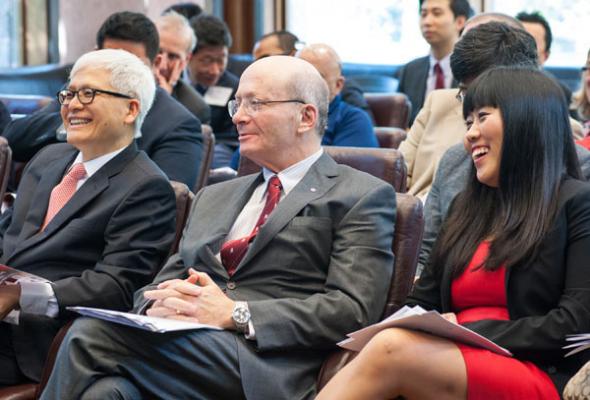
Korean officials, scholars strengthen ties with U of T
Published: June 23, 2015
Korea is more than 10,000 kilometres away from Toronto, but it was very much in the spotlight at the University of Toronto earlier this month, with a visit from the president of one of Korea’s top universities and a conference on Canada-Korea relations attended by high-ranking officials from government, academia and business.
The conference, Canadian-Korean Relations in the 21st Century: Opportunities, Challenges & Strategies, was organized by U of T history PhD student Tina Park, who also runs U of T’s annual Women in the House program, where female U of T students job-shadow MPs and senators in Ottawa. (Read about Women in the House here.)
Park said the conference was largely inspired by her doctoral dissertation, which examines a century of Canadian-Korean relations starting with Canadian missionaries sent from U of T in 1888. “As an international student from South Korea who grew up in Canada – I did both my undergrad and PhD at U of T – I find it fascinating how our relationship evolved so quickly from a handful of missionaries to such an active one today.” She said she worked closely with Massey College Master Hugh Segal on the conference.
“Hugh became a very close mentor for me when he joined Massey College as the Master and we began brainstorming for this conference last fall. We both felt that there is a huge gap, both at the intellectual level and at the practical level, about the future of Canadian-Korean relations. We felt that it would be important to generate a forum for discussion with high-caliber speakers for some strategic planning on how to move forward.”
At the conference, U of T's vice-president for government, international and community relations Judith Wolfson spoke about U of T’s Korean connections, which, she said, date back to the 1800s when alumnus James Gale worked in Korea as an educator, a writer and a translator from 1888 to 1927. In the 1970s, U of T became the first Canadian university to offer a course on Korea. Today, there are 582 students from Korea studying at U of T, with many more Canadians of Korean background also attending the university. The Munk School’s Center for the Study of Korea is one of the foremost places in North America for intercultural study about Korea, Wolfson said.
Also speaking at the conference were newly installed Korean ambassador Dae-Shik Jo, federal assistant deputy trade minister Ian Burney, U of T alumnus Sonny Cho of the Canada Korea Business Council, and U of T professors Don Brean and George Georgopoulos, who spoke about the implications of the recently signed Canada Korea Free Trade Agreement.
In his speech – his first since his appointment as ambassador – Jo urged increased cooperation between Korea and Canada in the areas of science, technology and innovation; arctic development, forest and agriculture, but cautioned that indifference on both sides could derail increased ties. “Our relationship is like oil and vinegar, if you don’t stir they’ll stay separate; if you do, they’ll combine to create something better – a delicious salad dressing.”
Park hopes the conference signals the beginning of a new tradition. “We hope to set up a new hub for research on Canadian-Korean relations, with an annual conference, publications, speaker series, and public engagement,” she said.
 Earlier that week, Yongmin Kim, the president of Pohang University of Science and Technology (POSTECH), toured the U of T campus and together with U of T President Meric Gertler signed a Memorandum of Understanding covering joint research collaborations, courses, faculty exchanges and other areas.
Earlier that week, Yongmin Kim, the president of Pohang University of Science and Technology (POSTECH), toured the U of T campus and together with U of T President Meric Gertler signed a Memorandum of Understanding covering joint research collaborations, courses, faculty exchanges and other areas.
Wolfson said POSTECH is “looking for our talent. They’re looking for the depths of our knowledge. And in turn, we’re looking for opportunities to work with them and their research. That leads to cooperation in areas of complementary strength.”
Terry Lavender is a writer with University of Toronto Communications.



